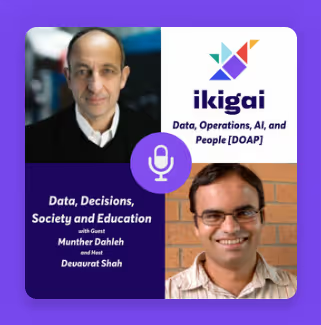Data, Operations, AI, and People [DOAP] Podcast: Munther Dahleh
CTO and co-founder Devavrat Shah chats with Munther Dahleh — the founding director of IDSS at MIT. Listen to their podcast now.

Episode 2 Synopsis. In Episode 2 of Data, Operations, AI, and People [DOAP], Devavrat Shah, Ikigai Labs’ CTO and co-founder, chats with Munther Dahleh — the founding director of IDSS at MIT. Together, they discuss IDSS and the role of data, data in organizations, and the role of education in creating data-enabled decision makers. Curious about seeing low-code tools in action? Read more here.
Episode Transcription
Devavrat Shah (00:09): Welcome everyone to another episode of DOAP: Data, Operations, AI and People. I’m Devavrat Shah, co-founder and CTO of Ikigai Labs. I have been a professor at MIT since 2005, where I’ve been teaching machine learning and statistics I’m a member of the Institute for Data, Systems, and Society, IDSS, where I had the distinct pleasure of being founding director of the Statistics and Data Science Center, SDSC, within its umbrella. I’m thrilled to have my colleague, friend, and founding director of IDSS, professor Munther Dahleh, who’s a visionary to say the least. IDSS was entirely his brainchild, and following him in this journey over the past decade has been definitely one of the high points of my academic career. Munther thank you for being with us. Let me start by asking you, why did you found IDSS and what is the vision and the mission of IDSS?
Munther Dahleh (01:09): Well, first of all, thanks Devavrat for the nice introduction. It’s definitely been an incredible journey, and it’s been wonderful to have that with you and others who are major contributors to building what I think is a great success, the IDSS program.
So let me just say that we launched IDSS almost now eight years ago with the idea of solving societal challenges in a rigorous and systematic way. When I talk about societal challenges, it often means challenges that have something to do with the society. Either the society is part of the challenge or the challenge is for the society. And you can think about a broad sense of things, whether you’re solving transportation problems, or energy problems, or market issues in terms of investments and so forth. All of these things are for the society and about the society.
And the key distinguishing aspect of them is that they often involve the interaction between some physical entities, some physical system, protocols, computational capability, physical systems, and so forth, biology. People, and institutions in terms of policy and markets, and what have you, to solve and to address challenges of this kind of a societal challenge need to bring all of these components together. And the only way we can bring these components together is to collect the data from all of these aspects. So data became the common area, the common substrate, that brought in all these different components to, in a non-trivial way. And the analysis of this type of heterogeneous, different timescale data, high-dimensional data became a very important question in answering important questions about policy, and broad questions about intervention, and broad questions about behavior. Those became more high-dimensional, heterogeneous time series statistical questions, which meant for us that we have to develop that aspect in our Institute. Hence the creation of IDSS, entirely centered around data science.
Devavrat Shah (03:14): Thanks Munther. Over the years, I have been in the audience where you’re presented the seeds of the vision, the vision itself. I’ve heard it, but every time I hear it, it’s always very refreshing and I feel energized. As you might have noticed at some level, the name of this podcast is very much along the lines of IDSS Data, Operations, AI, and People. Can you share your thoughts on the role of data within organizations and how modern organizations can try to utilize data a little better?
Munther Dahleh (03:49): Yeah, very much so. I think that organizations, now very differently from I would say 15, 20 years ago, track everything. Not only things that are related to their business model in terms of whatever they do, their sale, or their percentage in the market, and aspects of the business, but they track other things. They track the sentiment of workers. They try to understand the culture that they have, they understand their competition. Companies and organizations are constantly developing metrics for evaluating whether they’re doing something correctly or not. They’re very interested in intervention and change and understanding the impact of the intervention and change. And so what is happening is at the top level, you cannot be a successful leader of an organization without having a good appreciation of what the data means, and a good appreciation of the capabilities that the data can give you and the interaction with your data, to your business models and your systems.
And then at the lower layers, people are working with the data all the time. And so at some level, data has become so intertwined with everything an organization does, that education across the layers has to happen. And this is one of the things that we identified at IDSS, that we need to provide education, not only for the freshly graduated students who can actually take graduate level courses from us, but also for the senior executives who have been far away from computing and from grabbing and mathematics, but need to understand in a precise way, what data really means, and that education at all across all levels has to be provided. So we think data and organizations have become an integral piece, and education of the future leader and worker and so forth requires data science.
Devavrat Shah (05:39): That’s great. So I think it brings me to my next question, educational institution. At MIT, and at the head of the institution on data science, which is IDSS, how do you think IDSS MIT at large can help play a role in educating these data operators effectively?
Munther Dahleh (06:00): That’s a great question, because I think, you know, when we think about data science, there are two pieces to it that are really important.
One is the conceptual framework of processing data and drawing decisions. And I call this field decisions under uncertainty. It really is about how do we make decisions with partial information? Data is partial information, it is not the full information.
Devavrat Shah (06:20): Yeah.
Munther Dahleh (06:21): The important aspect is, when we do that, to do this correctly, to understand where we can make mistakes. A very interesting example of that was published in a medical journal that actually shows consumption of chocolate is related to winning a Nobel Prize. And the question is-
Devavrat Shah (06:40): We should eat chocolate now.
Munther Dahleh (06:43): Yeah. I think I love chocolate and I’m just waiting for my prize. And the truth is that, of course, there may be a correlation in this data, but is this a causation? Does it make me smarter to eat more chocolate? And I think that, that those are the types of questions that we struggle with all the time. We can measure correlations between different aspects, but what caused what is a much more complicated question, and often not that trivial to answer just by looking at the data, but sometimes it is. And understanding when we can answer the question of causality is an important aspect of understanding the conceptual piece of data.
Another thing is the level of uncertainty. I can run a program. I can get an answer of a prediction, but how good is this prediction? And how sensitive is this prediction to some assumptions that I’ve already made about my processes and my system? This is a level of understanding at the decision-making piece that is instrumental for us not to make errors and not to make extrapolations that are incorrect, then comes another piece of actually doing it.
You know, you can’t expect everybody to be an expert in Python and an amazing programmer. You really have to provide the platform that is easy to use for sophisticated computation. As we use our calculators to do sophisticated functions without thinking about them. I take a logarithm, but that’s an infinite series.
Devavrat Shah (08:00): Yes.
Munther Dahleh (08:01): You know, but I can do a computer algorithm on my calculator. I need to be able to do a decision tree without having to be a major Python programmer. So we need to provide platforms that are accessible, that don’t require depth in code and so forth. And these two pieces, when they come together, we will actually allow the penetration of this technology into the minds and action of day to day activity across the board, and this is exactly what we’re trying to do.
Devavrat Shah (08:28): It’s fantastic. Well, folks, again, I would like to thank Munther for being with us. This has been a great conversation. I hope you all would enjoy it. Stay tuned for the next episode.
Munther Dahleh (08:42): Thank you, thanks for interviewing me.
About the Speakers
Guest: Munther Dahleh (Director, Institute for Data Systems and Society)
Munther A. Dahleh received his Ph.D. degree from Rice University, Houston, TX, in 1987 in Electrical and Computer Engineering. Since then, he has been with the Department of Electrical Engineering and Computer Science (EECS), MIT, Cambridge, MA, where he is now the William A. Coolidge Professor of EECS. He is also a faculty affiliate of the Sloan School of Management. He is currently the Director of the newly formed MIT Institute for Data, Systems, and Society (IDSS). Previously, he held the positions of Associate Department Head of EECS, Acting Director of the Engineering Systems Division, and Acting Director of the Laboratory for Information and Decision Systems.
Dahleh is well-known for his seminal contributions to the field of networked systems and robust control. His research has impacted several application domains including transportation and autonomous systems, power grid, financial systems, and social networks. Dahleh’s work has appeared in economics and operations research venues, as well as 8 different IEEE Transactions, from Automatic Control to Biomedical Engineering to Network Science.
He is four-time recipient of the George Axelby outstanding paper award for best paper in IEEE Transactions on Automatic Control. He is also the recipient of the Donald P. Eckman award from the American Control Council in 1993 for the best control engineer under 35. He has given many keynote lectures at major conferences.
Host: Devavrat Shah (Co-founder and CTO, Ikigai Labs)
Devavrat is a Professor of AI+Decisions within the department of EECS at MIT. He is the founding director of the Statistics and Data Science Center at MIT.
He previously co-founded Celect ($35MM+ in funding, acquired by Nike in 2019) to help leading retailers utilize A.I. to optimize their inventories. He has made seminal contributions to statistical inference and machine learning that have had an impact in academia and industry.
Originally published on medium.com
Recommended articles
Subscribe to Ikigai Blog








